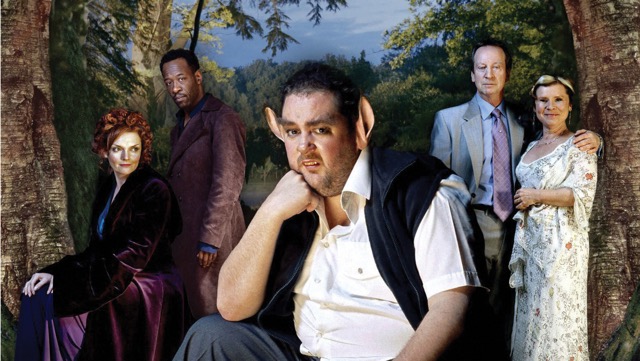Shakespeare Lives at the BUFVC
Since 1948 the BUFVC has always retained the vision, ‘to make moving image and sound as important in education and research as the written word’. In 2016, as both those inside and outside UK education celebrate Shakespeare’s legacy, it has never been more important for us to showcase our unique resources and project work relating to ‘Shakespeare on screen.’
Sixty-eight years after our creation we remain proud of our commitment to the collaborative development of academic resources. Our Shakespeare database provides a backbone of credible academic data for those engaged in Shakespeare-related teaching, learning and research, and our News on Screen database provides historically and culturally relevant newsreels on the Bard.
With our widened charitable remit we can now directly share our expertise and pedagogically framed resources with schools. Building on our educational heritage we can support the development of the next generation of learners and we have a clear role to play in delivering accessible, high-quality and reliable content and metadata. Thanks to a grant from the Mercers’ Trust we are starting a programme of work with London schools to develop BoB playlists and associated schemes of work that draw on our Shakespeare database. In 2016 we look forward to helping primary and secondary school celebrations of Shakespeare’s work.
Virginia Haworth-Galt, BUFVC Chief Executive

Johnny Vegas as Bottom in the BBC’s ShakespeaRe-told adaptation of A Midsummer Night’s Dream. (2005 © BBC)
An International Database of Shakespeare on Film, Television and Radio
The Shakespeare database was established in 2005, initially funded by the Arts and Humanities Research Council, and is now managed by the BUFVC. It is the authoritative online resource of Shakespeare-related content in film, radio, television, home video release and podcasts, international in scope and with records dating from 1898 to the present day.
Almost 9,000 titles are catalogued and indexed, encompassing full-length productions of the plays as well as parodies, plot borrowings, significant allusions, documentaries and news broadcasts. The data covers dance, opera, mime, comedy sketches, animation, advertising and even hip-hop, truly demonstrating how much the Bard has impacted traditional art forms and popular culture.
It provides a comprehensive history of Shakespeare in British broadcasting, its coverage of BBC radio and television productions from the 1920s to the 1960s being extensively researched from primary sources at the BBC Written Archives Centre
The database, free to all, aims to facilitate and stimulate new research on Shakespeare in sound and on screen and is supported by the BUFVC’s Library that holds an extensive collections of books and articles on Shakespeare and the media including its own publication, Shakespeare on Film, Television and Radio: the Researcher’s Guide.
This year will see many new filmed productions from many institutions including the BBC, the BFI and the RSC and these will be added to the database as soon as full information and availability is known. All archival holdings are noted and distribution information regularly updated.
http://bufvc.ac.uk/shakespeare
Olwen Terris, BUFVC Specialist Resource Officer
Shakespeare in Schools
Across the key stages of the National Curriculum – from Early Years through to GCSE – schools are, unsurprisingly, giving Shakespeare even more attention than usual this year. As a cornerstone of English Literature education, Shakespeare’s position has been further elevated in recent years by the requirements of 2014’s National Curriculum as students must now study at least two of his plays at Key Stage 3.
At the BUFVC, our work in providing access to audiovisual education resources will no doubt prove invaluable in wooing students to the Bard throughout 2016 and beyond. Chris Mooney, English and Media Studies teacher at the Bulmershe School, a subscriber to our BoB service, stresses the value of moving image in teaching Shakespeare in the twenty-first century: ‘the issue a lot of students face with Shakespeare is that it’s very dense, it’s a language they’re not familiar with and it looks alien to them. But if you’re able to show them the actual story in a visual way, they get it, they understand it.’
A quick search for ‘Shakespeare’ on BoB brings up 1,405 full programmes, while a search for just ‘Macbeth’ brings up 288 results alone, providing teachers with a wealth of content to teach and engage students. And with the recent addition of the BBC’s Shakespeare Archive Resource into BoB (see the article starting on on page six), our members now have even more content to build into their lessons.
Programmes like the 2010 adaptation of Macbeth starring Patrick Stewart and 2005’s ShakespeaRe-told adaptation of A Midsummer Night’s Dream, featuring Johnny Vegas as Bottom, are accessible via BoB and update these well-trodden classics with ingenuity and humour, making them invaluable resources for engaging GCSE level students.
As we now embark on the Mercers’ Trust project with primary and secondary schools to curate Shakespeare playlists for BoB, we will be continuing our work of bringing the Bard alive in the classroom.
Lincia Daniel, BUFVC Schools Membership and Support Officer
 Learning on Screen
Learning on Screen